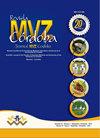Report of presumptive Perkinsus sp. hypnospores in Megapitaria squalida of the Gulf of California with the thioglycollate staining technique
IF 0.3
4区 农林科学
Q4 AGRICULTURE, DAIRY & ANIMAL SCIENCE
引用次数: 0
Abstract
Objective. To detect the presence of presumptive hypnospores of the protozoan Perkinsus sp. in a wild population of the Mexican chocolata clam Megapitaria squalida in the southeastern Gulf of California, using Ray´s fluid thioglycollate medium (RFTM). Material and methods. Thirty specimens with size between 56.17 and 69.04 mm were captured each month, during an annual cycle. Infection prevalence and intensity and water parameters were recorded monthly from September 2012 to September 2013. Results. Perkinsus sp. was detected in tissue samples from the Mexican chocolate clam using the RFTM test by the presence of dark round corpuscles that represent parasite´s hypnospores. Monthly samplings revealed a prevalence of 0-43.33% and an infection intensity ranging from 1 to 4 (no infection = 0 hypnospores/entire preparation, to moderate = 34 hypnospores/entire preparation). Conclusions. Perkinsus sp. is reported for the first time in a wild population of M. squalida in the southesternmost Gulf of California. The results indicate that this protozoan is dispersed intraspecifically and would now, potentially, parasiting a new host in the region.巯基乙酸盐染色技术在加利福尼亚湾角鲨Megapitaria squarida中发现Perkinsus sp.hypnospores的报告
客观的使用Ray的液体巯基乙酸盐培养基(RFTM),在加利福尼亚湾东南部的墨西哥巧克力蛤Megapitaria squarida的野生种群中检测原生动物Perkinsus sp.的假定孢子的存在。材料和方法。在一个年度周期内,每月采集30个尺寸在56.17至69.04毫米之间的标本。从2012年9月到2013年9月,每月记录感染率、强度和水参数。后果使用RFTM测试,在墨西哥巧克力蛤的组织样本中检测到Perkinsus sp.,其存在代表寄生虫孢子的黑色圆形小体。每月采样显示,患病率为0-43.33%,感染强度为1-4(无感染=0个孢子/整个制剂,中度=34个孢子/全部制剂)。结论。Perkinsus sp.首次在加利福尼亚湾最南端的角鲨分枝杆菌野生种群中被报道。结果表明,这种原生动物在种内分散,现在可能寄生在该地区的新宿主身上。
本文章由计算机程序翻译,如有差异,请以英文原文为准。
求助全文
约1分钟内获得全文
求助全文
来源期刊

Revista Mvz Cordoba
农林科学-奶制品与动物科学
CiteScore
0.70
自引率
0.00%
发文量
41
审稿时长
6-12 weeks
期刊介绍:
The Journal MVZ Córdoba is an open access international scientific journal financed and edited by the University of Córdoba (Colombia). The journal publishes quarterly, continuously in PDF, XML, Epub, original articles, literature reviews, brief communications and clinical cases, peer-reviewed (double-blind) in Spanish and English, which are related to the agricultural and veterinary sciences. The journal is directed to natural and legal persons of veterinary medicine, animal husbandry, public health, epidemiology, aquaculture, biology, basic biomedical sciences and biotechnology and constitutes a space for academic and scientific discussion around the work of professionals in Veterinary Medicine and Zootechnics. Four-monthly publication.
"The Journal MVZ Córdoba supports the policies for registration of clinical trials of the World Health Organization (WHO) and the International Committee of Medical Journal Editors (ICMJE), since it recognizes the importance of these initiatives for international registration and dissemination. of information about clinical studies, in open access. As a result, since 2007, the journal MVZ Córdoba only publishes clinical research articles that have received an identification number in one of the Clinical Trial Registries validated by the criteria established by WHO and ICMJE, whose addresses are available in the ICMJE website. The identification number is recorded at the end of the summary. "
 求助内容:
求助内容: 应助结果提醒方式:
应助结果提醒方式:


